The rights of at least 700 people were violated by the Ukrainian state or Russian-controlled Donbas and Crimea in 2018, according to the latest report by the Office of the United Nations High Commissioner for Human Rights in Ukraine.
Another 53 civilians were killed and 214 injured in Russia’s war against Ukraine in 2018. In almost five years of the war, over 10,300 people were killed, according to the United Nations, and 3,318 were civilians.
Additionally, up to 9,000 civilians were injured and more than 40,000 civilian homes have been damaged or destroyed in the hostilities since 2014.
“Systemic impunity for human rights violations and lack of effective remedy for civilian victims of the armed conflict hinder prospects for peace and stability,” the report says.
Impunity persisted in most of the 145 fundamental freedoms violations against journalists, civil society activists, lawyers and political figures. These groups must be better protected in 2019 against the backdrop of the upcoming elections, the report says.
Casualties of war
2018 has seen a 50 percent decrease in civilian casualties in the east of Ukraine compared to 2017. However, government forces and Russia-backed armed groups continued subjecting residents to risks by positioning and advancing within populated areas.
Clashes were particularly frequent around Zolote, a town divided into five blocks in the west of Luhansk Oblast. A mortar shell killed a mother and a daughter in the separatist-controlled Zolote 5 in October. A few days later, a mine or an explosive killed a woman and a man who went out to repair a broken electricity line in the government-controlled Zolote 4.
The UN Human Rights Office says there is “a disregard for the principles of distinction and precaution” by both parties that result in civilian casualties and damage to civilian infrastructure.
“’They liberated us’ is a bit too strong of a saying, to be honest. We were exposed to shelling before this liberation and we are exposed to shelling after it. So I do not see the point,” the UN cites a resident of Zolote 4, which was recovered by the government forces in June of 2018.
Injured and relatives of those killed as a result of the conflict suffer from the absence of comprehensive state policy and mechanism for remedy and reparation. So do the civilians whose property is being used or was damaged by both armed parties.
Many in vulnerable groups, such as children, the elderly and persons with disabilities can’t get pensions or social benefits, because of restrictions of movement across the contact line and lack of a registration as internally displaced people. In October, 47.65 percent of eligible retirees did not receive their pensions in Donetsk and Luhansk oblasts, according to the Pension Fund of Ukraine.
The UN Human Rights Office recommends Ukraine to establish a comprehensive state policy on compensation and reparation, to ensure freedom of movement for civilians, and to provide equal access to pensions and social benefits regardless of the place of residence or IDP registration.
“There are practical steps that the government of Ukraine can and should undertake as soon as possible to alleviate the suffering. Territorial integrity is not only about land. It is even more so about people wherever they are in Ukraine,” said Fiona Frazer, Head of the UN Human Rights Monitoring Mission in Ukraine, when presenting the report.

Fiona Frazer, Head of the UN Human Rights Monitoring Mission in Ukraine, speaks with journalists in Kyiv on Dec. 17, 2018. (Volodymyr Petrov)
Attacks on democratic space
The UN Human Rights Office has reported an increase in human rights violations affecting democratic space in Ukraine: violations of freedoms of opinion and expression, peaceful assembly and association, religion or belief, and the right to non-discrimination and equal protection under the law.
In 2018, there have been 145 reported cases of such violations. The trend has been gradually increasing throughout the year, which can be attributed to the forthcoming presidential and parliamentary elections in 2019.
While there has been progress by the police to protect demonstrators during some peaceful assemblies, like the Equality March in June, law enforcement failed to respond, classify and properly investigate attacks on many lower-profile mass events.
In one such case in November, instead of protecting a transgender march from extreme right-wing groups, the police pushed the demonstrators away from the scene and down into the metro, forcing them to cancel the rally.
The attacks on journalists have become increasingly bolder. Two attacks were perpetrated live in front of cameras by extreme right-wing groups against journalists of the pro-Russian NewsOne TV channel. Another journalist was attacked in court premises, in the presence of the UN Monitoring Mission.
In August, Kyiv’s Pechersky District Court granted prosecution access to cellphone data of an investigative journalist Natalie Sedletska. However, the European Court of Human Rights forbid the prosecutors to use Sedletska’s data, applying Rule 39 – interim measures used “where there is an imminent risk of irreparable harm.” The prosecution also received access to cellphone data of another investigative journalist Kristina Berdynskykh. The court has yet to rule on Berdynskykh’s appeal to the decision.
In 2018 there has also been an increase in attacks against civil society activists. The most emblematic case was the attack on Kateryna Gandziuk, a civic anti-corruption activist and local council member from Kherson.
Gandziuk died in a Kyiv hospital in November, after being attacked with acid in July, resulting in severe burns of her head and body. The suspected perpetrators and co-organizers of the attack now have been detained.
But unlike the notorious case of Gandziuk, most attacks on activists have not yet been properly investigated.
“Impunity for crimes emboldens perpetrators, leading to more violence. We therefore urge law enforcement agencies to appropriately classify all violent attacks, to investigate them effectively and timely. Perpetrators must be held accountable regardless of their affiliation with extreme right-wing groups or any other entities,” Frazer said.



